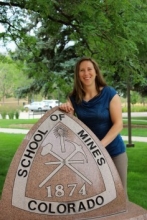ChEMS Seminar: Aggregation and Americium - Enabling Fuel Cycle Separations

Colorado School of the Mines
Golden, CO
Abstract: Although the United States currently operates an open nuclear fuel cycle, where used nuclear fuel (UNF) would be disposed of in a permanent geological repository, no geological repository has been identified for storage of (UNF). The previously planned repository for commercial UNF, Yucca Mountain, is not currently under consideration and would not be able to accept all commercial UNF produced to date. To address this problem, either an alternative/additional repository needs to be identified or the amount of UNF needs to be decreased. One way to decrease the amount of UNF fated for a given geological repository is to transmute the uranium, neptunium, plutonium and americium responsible for the long-term waste burden of UNF to shorter lived fission product elements. Transmutation requires the separation of these elements away from the fission products, cladding material and curium present in the UNF. Such separations could potentially be addressed using solvent, or liquid-liquid, extraction, though developed separations should require minimal reprocessing facilities to minimize cost and may need to be more resistant to organic phase aggregation (aka third phase formation) than separations developed in the past. This seminar will consider two parallel approaches to advance nuclear fuel cycle separations. The first will examine the co-recovery of recovery relevant actinides by completing their group oxidation to the hexavalent state. The second approach will study aggregation in the more classically considered PUREX (Plutonium, Uranium, Reduction Extraction) process.
Bio: Jenifer Shafer joined the faculty at Colorado School of Mines in the fall of 2012 after a two-year employment at Pacific Northwest National Laboratory. During her undergraduate research, she studied the solid-state synthesis of f-block elements at Colorado State University with former American Chemical Society (ACS) President Professor Peter Dorhout. In 2006 she joined the group of Professor Ken Nash at Washington State University (WSU). Here she examined the fundamental solution chemistry of the f-elements relevant to solid-liquid and liquid-liquid separations chemistry. While in graduate school, she was able complete an internship at Eichrom Technologies with ACS National Awardee (2016 Glenn T. Seaborg Award for Nuclear Chemistry) Phil Horwitz and further studied extraction chromatographic (solid-liquid) separations. She has joined the faculty at Colorado School of Mines to educate students on the fundamental and applied concerns of nuclear chemistry and radiochemistry (including the nuclear fuel cycle, nuclear forensics and radioisotope production) and is the ACS Division of Nuclear Chemistry & Technology chair elect. As a member of the Nuclear Engineering Program at Mines, she actively engages the U.S. Geological Survey 1 MW TRIGA Nuclear Reactor on the Denver Federal Center to accomplish research and educational goals.
Host: Mikael Nilsson
Share
Upcoming Events
-
MSE Special Seminar: Decarbonizing Industries for a Climate-resilient Future - From Renewable Energy to Sustainable Material Recovery
-
MAE 298 SEMINAR: Technology Developments for FIR Bolometric Detector Focal Plane Assemblies
-
CBE 298 Seminar: The Wisdom of the Crowd: Watching Bacterial Collectives (Re)shape Themselves
-
CEE Seminar: BIM and the Digital Twin
-
MSE Special Seminar: Revolutionizing Battery Technology - Engineering Quantum Materials for Enhanced Safety and Performance in Solid Electrolytes
